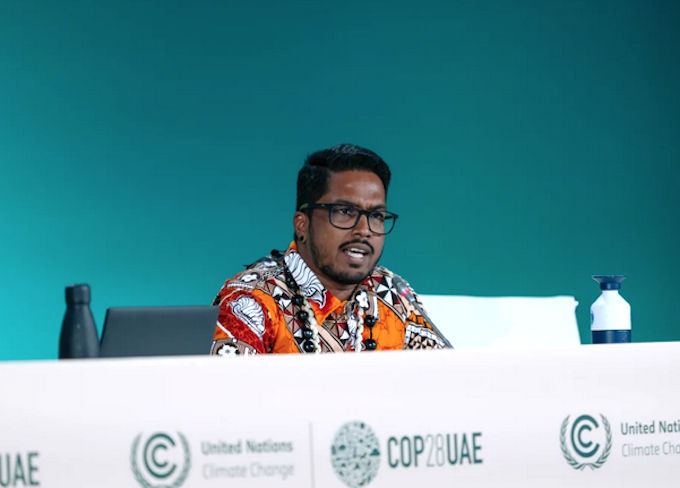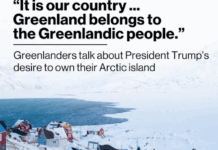
By Caleb Fotheringham, RNZ Pacific journalist
The United Nations climate conference in Brazil this month finished with an “extremely weak” outcome, according to one Pacific campaigner.
Shiva Gounden, the head of Pacific at Greenpeace Australia Pacific, said the multilateral process is currently being attacked, which is making it hard to reach a meaningful consensus on decisions.
“The credibility of COPs [Conference of Parties] is dropping somewhat but it can be salvaged if there’s a little bit of political will, that is visionary from across the world,” he said.
“The Pacific has showed leadership in this quite a bit in the last few COPs.”
Gounden said the outcomes of this COP and previous ones mean global temperature rise will not be limited to 1.5C — the threshold climate scientists say is needed to ensure a healthy planet.
“There are parties within the system who are attacking the science and the facts that show that we need to really be lot more ambitious than we are.
“If that continues there will be a lot more faith that’s lost by a lot of people across the world, and that can only be salvaged by political will and the unity of people across the world.”
No explicit cutting of fossil fuels
COP30 finished in Belém, Brazil, with an agreement that does not explicitly mention cutting fossil fuels. This is despite more than 80 countries pushing to advance previous commitments to transition away from oil, coal and gas.
“I feel the [outcome] was extremely weak,” Gounden said.
Pacific Islands Climate Action Network (PICAN) international policy lead Sindra Sharma said the outcome had not made much progress.
“It feels like just a waste of time to be honest, that we haven’t been able to close the ambition gap in any significant way, when a lot of the two weeks was also spent on reminding us that we are in a really bad place.
“We’re going to overshoot 1.5C and we need to do something about it.”
The meeting did finish a call to a least triple adaptation finance which Sharma said was a good signal.
“But if you look at the language, then it’s actually quite non-committal and weak.”

Based in Türkiye next year
COP31 will take place at the coastal city Antalya, Türkiye, next year and Australia will be president of negotiations in the lead up and at the meeting. It gives Australia significant control over deliberations.
A pre-COP will also be hosted in the Pacific.
Gounden said he hoped the plan would become more clear in the next few months.
“This is a very complicated situation where you’ve got a negotiation president that is actually not a host of the presidency as well as the COP president across the whole year, so all of that stuff still needs to be clear and specified.”
He said three different groupings need to work together to make COP work — Türkiye, Australia and the Pacific.
Sharma said the co-presidency between Australia and Türkiye was unusual.
“There’s going to be a lot of work in terms of the push and pull of how those two presidencies are able to work together.”

Disconnect between Australia and Pacific
Meanwhile, Tuvalu’s Climate Minister Maina Talia said the disconnect between the words and deeds of Australia when it came to climate action was “disheartening”.
Talia’s comments are part of a new report from The Fossil Free Pacific Campaign, which argues Australia is undermining the regional solidarity on climate.
Talia said Australia was a long-time friend of Tuvalu, so it was “heartbreaking to see the Albanese government continue to proactively support the continued expansion of the fossil fuel industry”.
“Australia has dramatically increased the amount of energy it generates from clean, renewable sources. But at the same time, coal mines have been extended and the gas industry has been encouraged to continue polluting up to 2070,” Talia said.
“It’s a decision that is hard to reconcile with the government’s own net zero by 2050 target and is incompatible with a viable future for Tuvalu.”
In September, Australia extended the North West Shelf — one of the world’s biggest gas export projects.
The report said Australia’s climate and energy policies are not consistent with the action needed to secure a 1.5C world. It said Australia now had an obligation to align with the International Court of Justice advisory opinion in July which found states could be held legally responsible for their greenhouse gas emissions.
‘Real game changer’
University of Melbourne’s Dr Elizabeth Hicks, a legal academic who was featured in the report, told RNZ Pacific the advisory opinion was a “real game changer” for Australia’s legal obligations.
“We’ve seen that Australian executive government, both under Liberal and Labor, governments continue to approve new fossil fuel projects and industries receive significant subsidies,” Hicks said.
Australia is the leading donor to Pacific Island countries, making up 43 percent of official development finance.
Hicks said that Australia positioned itself as part of the Pacific family, with the nation giving aid and acting as a security partner.
But equally Australia was responsible for the vast majority of emissions coming from the Pacific and had done little to limit fossil fuel expansion, she said.
Individuals and groups could bring lawsuits against their own countries for failing to comply with the court’s opinion, and states could also return to the International Court of Justice to hold each other to account.
The decision by the world’s top court had opened the possibility for countries to sue each other, sje said.
“This is placing Australia, right now in a very uncertain position. It would not be helpful for Australia’s domestic credibility on climate policy, or regionally in the Pacific context, to have proceedings brought against it.”
This article is republished under a community partnership agreement with RNZ.












































